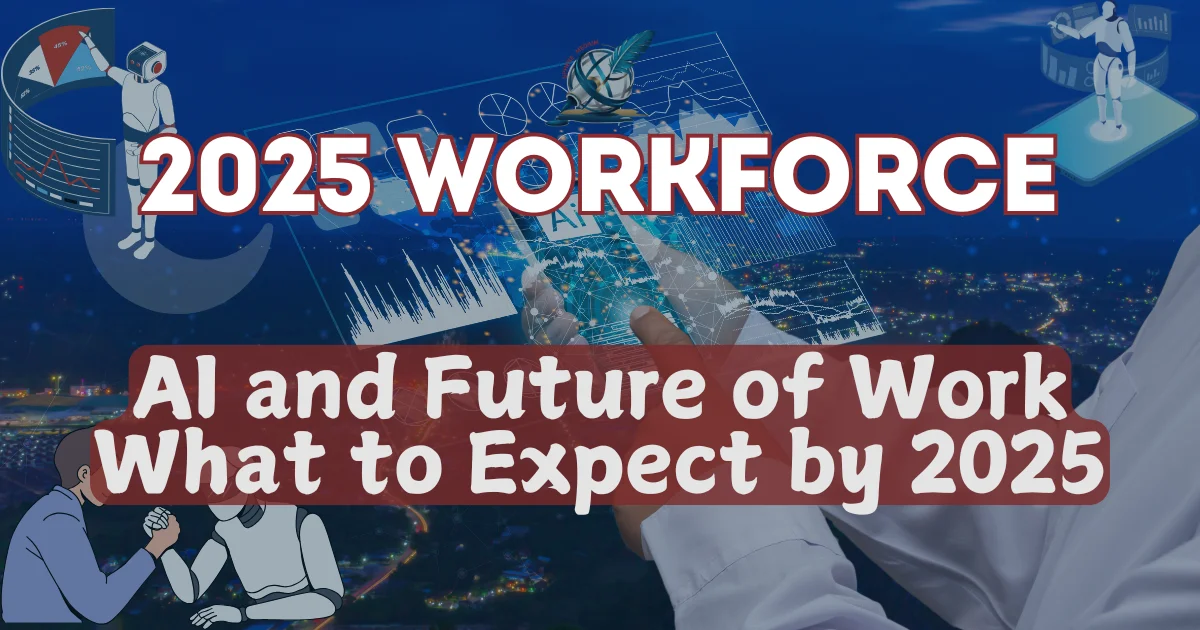The junction of artificial intelligence with the Future of Work is fast changing companies and business processes. Artificial intelligence will have more influence on task automation by 2025, so boosting smart technology output, and working with people. As more companies adopt artificial intelligence, the skills that employers seek from their employees will change dramatically and will provide both possibilities and difficulties.
In this article, we will examine the connection between AI and the Future of Work. We’ll discuss how automation, intelligent tools, and collaborating with AI will transform the workplace, the skills that workers need, and how companies will adjust to these developments.
Introduction
As the influence of AI and the Future of Work expands, industries are evolving at an unprecedented pace. The idea of AI is no longer confined to the tech world—it has become an essential component of modern workplaces, impacting everything from daily operations to long-term strategic planning. By 2025, AI will significantly change the way we work, particularly through automation and advanced decision-making tools.
The future of work is about blending human ingenuity with AI’s computational power. While some fear that automation will replace human jobs, AI and the Future of Work offer a more nuanced view where collaboration and new opportunities emerge.
AI-Driven Automation: The Role of AI and Future of Work
Automation and Job Roles by 2025
Roles in the workforce and technology by 2025 Automation is a key part of the link between AI and the Future of Work. By 2025, AI systems will be able to do a lot of boring, repetitive work. This will change the jobs of people in industries like transportation, manufacturing, and retail.
In the future, AI-powered robots will run assembly lines, and machine learning algorithms will handle jobs that need a lot of data. People will have more mental space to work on jobs that need more advanced planning and creativity.
But jobs won’t go away just because technology can do something. On the other side, AI and changes in the way work is done will create new employment for data scientists, digital ethicists, and those who understand how to keep AI functioning. These roles will become increasingly vital as more businesses employ AI to improve their ideas and productivity.
Balancing Job Loss and Creation in AI-Driven Industries
Monitoring employment in sectors driven by artificial intelligence both in loss and increase
The fact that artificial intelligence and the Future of Work could eliminate jobs is one of the key concerns about them. According to studies, technology might cause 15% to 20% of employment to vanish.Nonetheless, artificial intelligence will create new career opportunities, particularly in data science, AI development, and machine collaboration. Jobs in professions that require critical thinking, emotional management, and creativity are likely to be abundant.
Businesses must ensure that the workforce is prepared for this change by combining technological use with attempts to create new jobs by 2025.
Smart Tools and Human-AI Collaboration in the Future Workplace
Enhancing Workflows Through Smart Tools
In order to understand AI and its impact on the future of work, we need to use advanced tools. Software driven by artificial intelligence can handle mundane jobs like scheduling, data entry, and customer inquiries, freeing up individuals to focus on more strategic endeavors.Analytics solutions driven by artificial intelligence enable companies to make better decisions in less time by immediately evaluating enormous information and providing actionable insights.
Project management will become more effective and employee productivity will increase as these clever technologies are included into the AI and future of work framework. Less time will thus be dedicated to dull tasks.
Human-AI Collaboration: A New Partnership
One of the most important aspects of artificial intelligence and the future of work will be when humans and AI work together. In the future, artificial intelligence will not serve to replace human workers but rather to serve as a collaborative assistant, assisting employees in the decision-making process.AI will help with things like healthcare, banks, and supply chain management by giving them real-time information. This means that workers will be able to make choices faster and with more information than ever before.
AI will provide the data and analysis, while people will be able to drive business results through their intuition, creativity, and empathy. This relationship between AI and humans is important to the workplace of the future.
Shifting Skills in the Era of AI and Future of Work
Essential Skills for the AI-Powered Workplace
AI and Future of Work revolution, people will need to learn new skills to keep up. In a world where machines do most of the boring work, people will need to get better at skills that computers can’t copy. Artificial intelligence is changing the way people work, so people will need to learn new skills to keep up. As a result of AI’s impact on the workplace, workers will have to acquire new knowledge and abilities to remain competitive. People will have to hone abilities that computers can’t replicate if we live in a future when machines perform the majority of the tedious labor. Among these characteristics are qualities like emotional intelligence, originality, leadership, and problem-solving skills. Knowledge of data analysis, machine learning, and artificial intelligence tools will also make you more marketable to potential employers.
Data analysis skills, proficiency with AI-powered tools, and knowledge on how to manage AI systems will be in high demand by 2025. Those who are flexible enough to adjust to these developments will thrive in fields that heavily utilize AI.
How Companies Are Adapting to the Future of Work
To prepare for the changes brought by AI and Future of Work, companies are investing in upskilling and reskilling programs.
They are investing money in programs that assist individuals in acquiring new skills and preparing themselves for the changes that will be brought about by artificial intelligence and the future of work. The primary objectives of these programs are to educate staff workers on various aspects of technology and teach them how to make use of various AI tools.
Additionally, businesses are working with schools to make sure that the next generation of workers has the skills needed in an age driven by AI.
Business Adaptation in AI and Future of Work
Opportunities and Challenges for Businesses
If (artificial intelligence) AI and Future of Work are brought together, then businesses will be faced with opportunities as well as issues that they will need to solve. It is possible that corporations will be able to save money, that individuals will be satisfied, and that new ways of making money will be discovered with the assistance of artificial intelligence.
Nevertheless, companies have a responsibility to educate their employees, ensure that their information technology systems are always up to date, and figure out how to address the ethical concerns that occur when artificial intelligence is used in computer programs.
Businesses that make use of artificial intelligence (AI), make investments in new ideas, and encourage their employees to continue their education will be successful in the year 2025 because they will be able to withstand all of the technological advancements that will occur.
Ethical Considerations in the AI-Driven Future
As AI and Future of Work evolve, ethical concerns become increasingly important.
Dealing with moral considerations is crucial as AI and the future of employment grow. Responsible usage of AI systems requires solutions to pressing issues such data privacy, algorithmic bias, and AI transparency. Businesses should be held accountable for creating, deploying, and supervising AI systems.
In the future workplace, organizations’ ability to establish trust with stakeholders, employees, and customers will be greatly influenced by the ethical implications of artificial intelligence.
Conclusion
There have been new opportunities for growth, speed, and new ideas that have surfaced as a result of the altered way in which businesses operate as a direct result of the connection between artificial intelligence and the future of work. It is anticipated that by the year 2025, artificial intelligence will have achieved mastery in the art of automating repetitive tasks, improved tools to maximize output, and promoted closer collaboration between AI and human workers. Therefore, in order for businesses and employees alike to successfully adapt, they will need to acquire new information and handle the ethical concerns that are brought by artificial intelligence.
In the future, artificial intelligence and humans will work together rather than compete with one another. The contrary will be true; robots will make use of their capabilities to help humans progress in their respective fields.
FAQs
No, AI won’t be able to do all things that people do now. The connection between AI and the Future of Work will create new job possibilities in fields like data science, AI management, and jobs that need creativity and sensitivity from people, while some jobs will be taken over by machines.
In the AI and Future of Work times, it will be important to be able to analyze data, solve problems, be emotionally intelligent, and be technically proficient with AI technologies. Also, soft skills like leadership and imagination will become more and more important.
Artificial intelligence (AI) and the future of work will make it easier for people to work together by automating tasks that are done over and over again and giving teams real-time information that helps them make faster, better choices.In many parts of the company, collaboration between humans and AI will become the norm.
Improving employee skills and addressing moral concerns like data protection and artificial bias are two of the many big challenges that organizations will face as a result of the relationship between AI and Future of Work.
In order to better prepare themselves for the upcoming work environment, individuals should better prepare themselves by placing an emphasis on lifelong learning, improving their technical data analysis and artificial intelligence skills, and nurturing soft talents such as problem-solving and ingenuity. All of these will, as a consequence, be compatible with technologies that are driven by artificial intelligence in the workplace of the future.

Business Consultant | Web designer & Developer | Social media Manager | SEO | Passionate Learner, I am deeply passionate about learning and continuously improving my skills.
My interests are diverse, ranging from music and singing to computers and programming languages, digital art, AI



2 Comments
What an informative blog post!
Thankyou, 😊 I’m glad you found the post informative. Stay tuned for more insightful content!